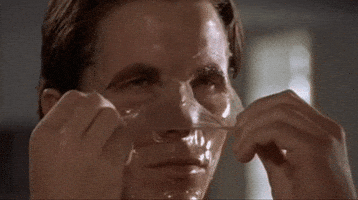Zeekie
Apricot
- Joined
- May 18, 2024
- Posts
- 4,222
- Reputation
- 5,776
~Minimalist Skincare Routine~

Introduction
There are a bunch of threads on this site for good skin, and while I’m not denying some of the advice is good and works, a lot of it comes from people who have fallen for the lies of the skincare industry. You don’t need three serums, four cleansers, or a baby’s blood ointment for clear skin. What led you to believe you do is a lot of very good marketing, designed to make you buy as much as possible.The truth is, you only need three products for the best skin of your life, maybe a few more depending on some edge cases, which I’ll explain later in this guide. So if you want great skin without spending hundreds of dollars or hours applying unnecessary stuff to your face, read on. I will explain a biologically appropriate and dermatologist-approved skincare routine that will help your skin.
BASIC SKIN NEEDS
All human skin has the same basic needs: access to water and adequate nutrients, with a specific emphasis on vitamins B3, A, C, and E. (Of course, all organ systems benefit from all micronutrients.) Thankfully, we can fulfill most of these needs through our habits. If you eat a balanced diet with no micronutrient deficiencies, and you're drinking enough water throughout the day, your skin will have most of the foundational building blocks it needs to be healthy.However, there are three special needs our skin has that can’t generally be addressed through diet alone:
- All skin needs to be clean.
- All skin needs to be protected from UV radiation.
- All skin requires high amounts of vitamin A (more on this later).
ALL SKIN REQUIRES TO BE CLEAN
If your skin is dirty or greasy, it’s going to be compromised. Why? Because of pathogens, pore-clogging gunk, and other stuff that messes with your skin barrier, all of which cause texture issues and breakouts. This is why you HAVE to clean your skin.The obvious choice is a cleanser, but most people use the wrong one. Your skin type is unique, it can be oily, dry, normal, or sensitive, and different cleansers are made for different types. Using the wrong one can easily make you break out. What’s worse, using a cleanser that’s too stripping removes too much of your natural oil and compromises your skin barrier, which is NOT good.
As a rule of thumb, only wash your face with a cleanser at night. In the morning, a splash of water is enough unless your skin is super oily. That natural oil that builds up overnight is there for a reason. At night, choose a cleanser tailored to you: if you have dry skin, opt for a hydrating one, if you have oily skin, choose a foaming one. Specific brands are a personal preference, so experiment. As long as you’re not breaking out or your skin doesn't feel tight and dry after cleansing, you’re golden.
ALL SKIN REQUIRES UV PROTECTION
Yes, people, the sun will fuck up your skin. So if you don’t want to end up like Lachowski (who allegedly does not do skincare), USE A FUCKING SUNSCREEN.
(this man is barely 30 btw)
UV radiation is what destroys your collagen and elastin, which is going to age you like crazy. It also damages your DNA, which puts you at a greater risk of skin cancer.
The verdict: USE YOUR SUNSCREEN.
Just like with cleansers, the right sunscreen for you depends on your skin type. If you’re dry or sensitive, a mineral sunscreen is usually best. If you're oily, a chemical one might work better. If you have normal skin, either works. Or pick what you like, just use it.
A couple of notes on sunscreen types:
- Mineral Sunscreens are great, but if you're ethnic or tan, be careful. These tend to leave a nasty white cast. But again, they're great for people with sensitive skin that may react to the organic compounds of chemical ones.
- Chemical Sunscreens sound scary because of all the fearmongering from ancestral bros, but years of clinical testing don’t lie, they’re safe. The amount that gets absorbed into your blood is so tiny it's basically nothing (less than 1-5%), and these compounds have a very weak affinity for your body's estrogen receptors, so they're not even activating estrogenic responses either. To put it in perspective, a single glass of milk has more bioavailable estrogens than the sunscreen you put on your face. So if you're scared of sunscreen but drink milk, you’re just falling for propaganda. Both milk and chemical sunscreens are safe.
ALL SKIN REQUIRES VITAMIN A
I previously mentioned that all skin needs certain vitamins, one of these being Vitamin A. Your body is a little asshole who prioritizes feeding other organs (like your eyes) with Vitamin A first, so your skin is usually left with scraps. This is a problem, because Vitamin A is incredibly important for your skin. When it's in your skin, it gets converted into its active form, retinoic acid, which then binds to receptors in your cells. This triggers a cascade of benefits: it increases skin cell turnover, reduces oil production, and dramatically reduces wrinkles and texture issues.Vitamin A in skincare is referred to as a "retinoid." If you’ve been on this forum for long enough, you’ve likely heard of many of them: retinol, retinal, adapalene, tretinoin, tazarotene, and Accutane. All of these compounds are in some way a form of Vitamin A, and their ultimate goal is to be converted into all-trans-retinoic acid and activate those receptors in your cells.
Which retinoid you should use depends on your case. Mild acne might only require something like retinol, retinal, or adapalene. For stronger cases, you'll need prescription-only options like tretinoin, tazarotene, or Accutane.
IN MY OPINION, at a minimum, start with retinal or adapalene and work your way up to tretinoin or tazarotene. Don't just stop when your acne clears if you want the collagen-boosting and anti-aging benefits, use the strongest weapon you can handle. I would avoid retinol since it's very weak.
When you start using a topical retinoid, you'll likely go through a period of dryness, peeling, and breakouts (often called a "purge"). This is normal and usually only lasts a few weeks. To minimize it, start slow: 1-2 times a week, then gradually build up your usage as your skin tolerates it.
Accutane can be an option for acne but should be a last resort for severe cases, and only used under a dermatologist’s supervision. For mild acne, it’s better to avoid it entirely or, at most, microdose very carefully since it has significant systemic effects because it reduces oil production and activates RAR gamma receptors throughout the body, leading to dry joints, eye dryness, altered lipid profiles, and possible reductions in growth hormone. It’s also unsafe during pregnancy, if y'all cared. In short, only use Accutane when truly necessary.
Sample Skincare Routine
The most basic routine you can do to get 90% of the results is as follows:AM:
- Wash your face with water.
- Put on a sunscreen (if you'll be leaving your home).
- Use a cleanser.
- Put on a retinoid.
Unless you have naturally dry skin, are dealing with retinoid adaptation, or have a damaged skin barrier, moisturizers are fully optional. Your skin has adapted over millions of years to produce just what it needs to be healthy. A lot of people have no need for a moisturizer. In fact, for some, using an expensive moisturizer with unproven ingredients can actually make their skin worse.
That said, if you do have dry skin or your skin barrier is compromised (maybe you overdid it with a retinoid or an exfoliant), a moisturizer is your friend. Look for one with ceramides and/or niacinamide (B3). This will temporarily help repair your skin and make it happy again.
That said, if you do have dry skin or your skin barrier is compromised (maybe you overdid it with a retinoid or an exfoliant), a moisturizer is your friend. Look for one with ceramides and/or niacinamide (B3). This will temporarily help repair your skin and make it happy again.
Since retinoids make you more sun-sensitive, you HAVE to use sunscreen. A sunscreen only matters if you will be outside during high UV hours. If the UV index is very low or you’ll be staying indoors all day, you can probably skip it. But even with sunscreen on, it’s always best to avoid the sun if you can.
Not really. Your skin naturally exfoliates itself. Retinoids down the line will remove most of the fundamental reasons you would use an exfoliant, but the adaptation takes weeks or months. So if you're in a rush to get the best skin, it's okay to temporarily include an acid serum or a cleanser with an acid in it. Just remember that retinoids do all the work over time.
If you have a specific skin condition, you might need to add other things to your routine.
- For hyperpigmentation, consider adding hydroquinone, azelaic acid or Vitamin C.
- For very textured skin, you might want to try azelaic acid or a weekly exfoliant.
- For rosacea or eczema, please patch-test any new product before using it all over your face, or even better, talk to a dermatologist and don't listen to some random dude on .org...
- For fungal acne (caused by a fungus, not oil or bacteria), use a shampoo with ketoconazole once a week, or even every day, instead of a normal cleanser.
- Other people may need special actives in their regular routine, but this is only a very small subset of people, I'm not saying "don't use other stuff" if you really need them, but most people have a bunch of bulk products in their routines that do nothing. If that ain't you, then good, do what's best.
There are other therapies that may help your skin, such as GHK-CU (I'd only do it topically), Red Light Therapy, or Microneedling. These are optional, "nice-to-have" additions, but the three core principles, cleansing, UV protection, and Vitamin A, will give you 90% of the results.
Hope this thread is helpful. I'll be answering any questions and responding to any bullshit from dietcels coping and saying "just eat healthy." Love y'all





 love the support tho
love the support tho





